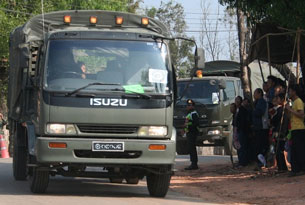Laos: UN wants access to Hmong
| Publisher | Radio Free Asia |
| Publication Date | 13 January 2010 |
| Cite as | Radio Free Asia, Laos: UN wants access to Hmong, 13 January 2010, available at: https://www.refworld.org/docid/4b59ad7ac.html [accessed 20 May 2023] |
| Disclaimer | This is not a UNHCR publication. UNHCR is not responsible for, nor does it necessarily endorse, its content. Any views expressed are solely those of the author or publisher and do not necessarily reflect those of UNHCR, the United Nations or its Member States. |
2010-01-13
The UN refugee agency wants to meet with ethnic Hmong sent back to Laos.
 The first Thai military truck carrying Hmong refugees departs for Laos, Dec. 28, 2009. Pimuk Rakkanam/RFA
The first Thai military truck carrying Hmong refugees departs for Laos, Dec. 28, 2009. Pimuk Rakkanam/RFA
BANGKOK – U.N. refugee officials want access to a group of more than 150 ethnic Hmong they believe may have been wrongly repatriated to Laos from Thailand, to find out if they still want to resettle in a third country, according to the refugee agency spokeswoman.
Kitty Mackinsey, spokeswoman for the United Nations High Commissioner for Refugees (UNHCR), said the offer to resettle is still available to the 158 Hmong, who claim they could face persecution in Laos.
The agency hopes to meet with the group to verify claims by the Lao Foreign Ministry that they returned to Laos voluntarily in late December, she said.
"We would like to get access to them to help facilitate their resettlement, because the resettlement countries still are offering them places to go.... The last time we talked to them they did want to go for resettlement," Mackinsey said.
"We would like to have access to the people in Laos to talk to them and find out what their true wishes are."
The 158, all of whom have been designated "people of concern" by the UNHCR and could face persecution in Laos, were repatriated from Thailand along with a much larger group from another camp in Petchabun at the end of December.
They had been held in a detention center overseen by immigration police in Nong Khai, Thailand.
Lao Foreign Ministry spokesman Khenthong Nuanthasing said Monday that all 158 had "changed their minds."
Reunited
"They have changed their minds upon arrival and reunited with Hmong communities in their home country," Khenthong told the Thai newspaper The Nation.
Khenthong said the group had decided to stay after from Lao authorities treated them well on arrival, adding that even Hmong leader Blia Shoua Her had decided to live in the Ban Pha Lak resettlement village outside of the Lao capital Vientiane with his family.
Lao authorities have said the Hmong will receive assistance and be reintegrated into Lao society, but they added they will not grant access to the group until they have been resettled.
The UNHCR has no formal presence in Laos.
Hmong repatriation
Thailand repatriated 4,711 Hmong refugees on Dec. 28 from Petchabun and Nong Khai, despite concern for the group's treatment by Lao authorities upon their return.
Thai military units equipped with riot shields and batons entered a refugee camp at Huay Nam Khao in Petchabun and forced thousands of Hmong onto buses, sending them back across the Mekong River into Laos.
The forced repatriations ended years of uncertainty over the status of the Hmong.
Known as America's "forgotten allies," the Hmong sided with the United States during the Vietnam War and many fled Laos in 1975 when the communist Pathet Lao took power.
Tens of thousands have since been resettled in the United States.
Many Hmong say they fear persecution from the Lao government because of their Vietnam War-era ties with the United States.
Some Hmong fought under CIA advisers during a so-called "secret war" against communists in Laos.
A number of Lao Hmong are still being held in refugee camps in Thailand's Lopburi and Huay Kwang, but it is unclear what the Thai government plans to do with those groups.
"We do not have any indications from the Thai government that any more people are going to be deported," UNHCR's Mackinsey said.
Resettlement process
Lao authorities said they have moved most of the Hmong to a newly developed area in Ban Pattana in Vientiane province.
Hundreds of other returnees have been sent to provinces around Laos that host Hmong communities.
The Lao Foreign Ministry said Lao authorities have given 300,000 kip (U.S. $35) in cash to each member of the Hmong returnees, land for farming, and one year's worth of rice.
Authorities also opened the Hmong resettlement village in Ban Pha Lak to visiting U.S. congressmen led by House Foreign Affairs Committee member Eni Faleomavaega over the weekend.
Faleomavaega told a news conference Saturday he found no evidence of abuse of the Hmong by Lao authorities.
Original reporting by RFA's Lao service. Lao service director: Viengsay Luangkhot. Written for the Web in English by Joshua Lipes. Edited by Sarah Jackson-Han.
Link to original story on RFA website
